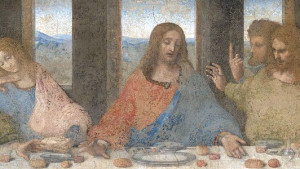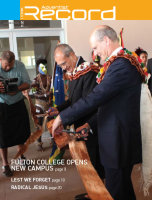I recently came across a conversation on the online blogging platform Tumblr that has been doing the internet rounds. The conversation went like this:
“‘Why is my language not clear to you? Because you are unable to hear what I say’ (John 8:43).
“Wait, did Jesus just say the equivalent of ‘Did I stutter?’ Jesus is such a rebel.”
Jesus the rebel: it’s an interesting concept. But, if you think about it, that’s what He was—a revolutionary, rebelling against the status quo. The conversation got me thinking: if Jesus were around today, what would He be saying? Because—well, let’s face it—Jesus was a pretty radical nonconformist.
If you’re like me, you’ve grown up learning about Jesus and the Pharisees. We’ve heard the children’s stories that paint the Pharisees as the bad guys while Jesus is the Hero. We even had kids' songs about it, like “I Just Wanna be a Sheep” (my childhood favourite), where the third verse says “I don’t wanna be a Pharisee / they’re just not fair you see.”
But like many realistic villains, the Pharisees had good intentions. They sought to obey the Scriptures and follow their God. They prayed daily, went to church and spent their lives trying to become more holy. However, their fundamental problem was that they were putting doctrines before people. As a result, traditions and symbols had been stripped of all their meaning and became mere rules, to be obeyed under threat of condemnation. Don’t walk long distances on Sabbath. Don’t light fires. Don’t associate with diseased people or you’ll become unclean.
The Pharisees were known for the things they didn’t do.
Jesus was known for the things He did.
Outside of our church walls, Christianity doesn’t tend to have the greatest rap sheet. Type "Christian" into Google News and you’ll likely find a host of stories on the things we’re known to be against. Anti-gay parades, rants about women and their "place", articles on Christian oppression. As Christians—Adventists even—we’re known more for the things we stand against than the things we stand for.
Sound familiar?
“How can I make this any more simple!” Jesus might say today. “Love the Lord your God, your Creator, and love those around you. You have been created for so much more than this ritual-following, straight-line walking, closed-minded lifestyle that you’ve been living.”
But loving people takes time, and time in today’s fast-paced world is particularly precious. It’s so much easier (and quicker) to abide by rules than to reach out and form relationships. Dare I say it, but without those relationships, maybe we too are missing the point?
How many non-Christians do we associate with on a regular basis? I’m ashamed to say that for me, I can count that number on one hand. I live with Christians, work with Christians and go on social outings with Christians. It’s easier that way. There are fewer explanations required, it’s far more comfortable and it’s easier to remain "clean". But that’s not how Jesus did it. Radical Jesus, bold Jesus, spent His life hanging out with tax collectors and adulterers, being the Friend and the Confidant they needed.
If we’re called as Christians to be Christ-like, then we too are called to radically love those around us. No exceptions. Gay and straight. Those for and against women’s ordination. Those who want drums in worship and those who don’t. That means people in and out of the church doors: coffee drinkers and Milo lovers, vegans, vegetarians, carnivores, and the ones who eat bacon and egg McMuffins on the way to Sabbath School. It doesn’t mean we have to agree with them. It does mean we should love them—really love them—anyway.
It’s easy to put our Christianity in a box, to take it out only on Sabbaths and in small groups. But unconditional, radical love can’t be boxed. Maybe that’s what makes it so difficult. And if Jesus was a radical in His day, what makes us think He wouldn’t be a radical in ours?
Let’s give the media something positive to talk about by following our radical Saviour—loving people, not just our rules.
Sara Thompson is a Communications graduate from Avondale College and writes from Cooranbong, NSW. She recently served as assistant editor while interning at Signs Publishing Company.






